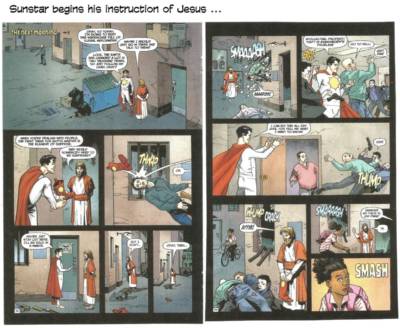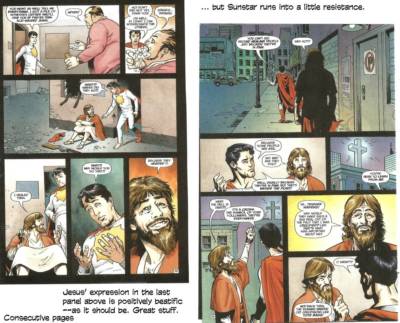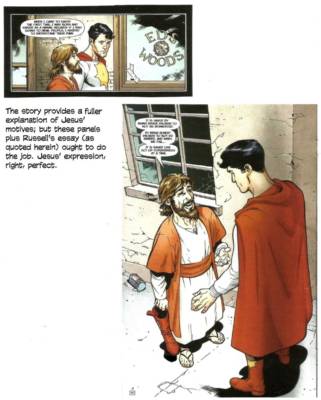Comic book review: ‘Another Second Coming’
TO SAY THAT Mark Russell’s comic book Second Coming is about Jesus coming back to Earth (as promised, remember? — His return after being crucified?) and being appalled to see that mankind prefers the morality of a superhero to His teachings is to sell the book shamefully short. It’s much more than that.
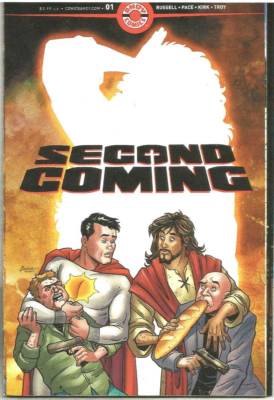 Originally intended for a launch last March, the title was officially canceled by DC Comics in mid-February in a chicken-hearted reaction to an online mob decrying the book’s “inappropriate [and] blasphemous content.” Ahoy Comics, recognizing a serious landmark satire when it sees one, took up the title and published the book earlier this summer. And therein, Russell explains his purpose in writing the story.
Originally intended for a launch last March, the title was officially canceled by DC Comics in mid-February in a chicken-hearted reaction to an online mob decrying the book’s “inappropriate [and] blasphemous content.” Ahoy Comics, recognizing a serious landmark satire when it sees one, took up the title and published the book earlier this summer. And therein, Russell explains his purpose in writing the story.
The short explanation, he says, is that “I had as much right to an opinion on the meaning of Christ’s teachings and their legacy as anyone else — that was enough to get me labeled a blasphemer.”
His blasphemy, he goes on, is in taking a stab “at what I think Christ came to Earth to accomplish and how he’d feel about returning to find that mega-church tycoons, prosperity doctrine charlatans, and media anger-merchants had made themselves the executors of his estate.”
The superhero angle in Second Coming is “a meditation on power. … [that] physical force solves problems. ‘Good’ is simply a matter of using violence better than ‘evil.’ In a world where our problems are increasingly immune to violent solutions … no amount of drop-kicking people is going to solve global warming or get your sick mom the health care she needs. …
“And that is why bringing Christ into a superhero comic made sense to me. He is the counterpoint to the assumption that you can fix the world with punishment. To me, that is the core of Christ’s mission to Earth — to show human beings that we could build a world immune to the threat of violence and to the seduction of bribery if only we chose to be so ourselves. That’s also what made it necessary for any self-respecting empire to crucify him.”
To demonstrate what he means, Russell presents a story in comic book format.
The story begins with God creating Adam and Eve because he was lonely. He tells them not to eat the fruit of the Tree of Knowledge of Good and Evil. But God, being new to human beings, doesn’t realize that telling them not to do a thing is as good as a guarantee that they’ll do just that. (The tree’s fruit, incidentally, is shaped like penises and vaginas and female breasts.)
Adam and Eve chomp down.
“Do you know what an evil thing you’ve done?” God rages at Adam and Eve.
Eve says: “How could we have known until after eating it?”
“Damn it, Eve,” says God, “— don’t lawyer-ball me.”
He’s pissed. And he sends Adam and Eve out of the Garden of Eden, and as extra punishment, he orders them to become parents. Ultimately, their descendants populate Earth, but it goes wrong almost at once.
Humans started murdering each other “when there were, like, only four people on the planet. … Keeping the human race from devouring itself soon became a full time job for God.”
Before long, God gives up on people.
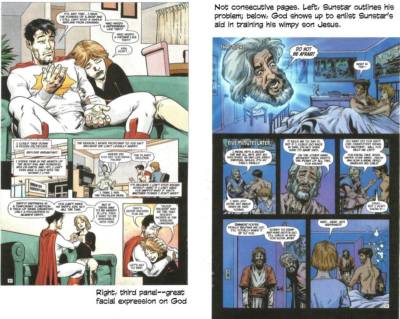 “From now on, they’re on their own,” he says, adding that he did try drowning them in order to make matters better. No luck.
“From now on, they’re on their own,” he says, adding that he did try drowning them in order to make matters better. No luck.
Jesus, observing all this over the eons, decides to “give it a shot,” to “help them in his own way.”
God encourages him. But when He checks up on His son several years later, He’s outraged to learn that His son has been arrested and crucified.
“How’s that supposed to make me look?” God says, obviously enraged. He forbids Jesus from going back to Earth as he promised “until he learns to act like a real god.”
Russell shifts the scene to present day, and we meet Sunstar, the superhero, flying around and doing deeds that involve slugging miscreants. But Sunstar is having problems of his own: his girlfriend and he want to have a child, but they can’t get married because he’s from a different planet. (And other obstacles.)
God visits the couple and begs Sunstar to take Jesus under his wing and show him how “a real hero” does his job. Sunstar agrees, and Jesus shows up.
Sunstar takes Jesus with him on one of his enforcement errands, but when Jesus persists in not understanding Sunstar’s need to bash the bad guys, Sunstar leaves him outside of the building he enters to do his bashing. And while Sunstar is inside, Jesus heals the bad guys Sunstar left for him to guard.
Thus, embodying Russell’s message in Second Coming: the world isn’t saved by violence, by bribery — by power. “It is saved,” Jesus says, “by being brave enough to not be intimidated. By being honest enough to not be bribed. And when we fail, it is saved one act of forgiveness at a time.”
Jesus says this to Sunstar on the last page of the story, having embodied His doctrine. And artist Richard Pace handily embodies Russell’s story with realistic renderings that are flexible enough to permit having a little old-timey cartoonery fun, too. His portraits of an irritable God and a blandly well-wishing Jesus are exactly what Russell’s satire requires.
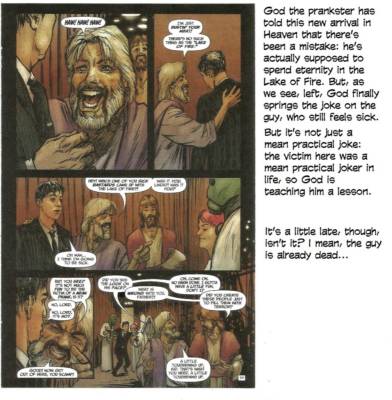 In one episode of Second Coming, God plays a prank on a new arrival in Heaven, telling him that he’s going to be cast in the Lake of Fire. As the poor soul slowly realizes his fate and gets a little sick, God suddenly reveals that it’s a joke, a prank that He’s playing on the guy, who, on Earth, played pranks on others. Pace gives us a visual of God the prankster that is as persuasive as all the other pictures he’s made for this book.
In one episode of Second Coming, God plays a prank on a new arrival in Heaven, telling him that he’s going to be cast in the Lake of Fire. As the poor soul slowly realizes his fate and gets a little sick, God suddenly reveals that it’s a joke, a prank that He’s playing on the guy, who, on Earth, played pranks on others. Pace gives us a visual of God the prankster that is as persuasive as all the other pictures he’s made for this book.
Completed self-contained episodes abound in the book. They show us God, pissed off at His creation which doesn’t work the way He wanted it to. And in a succession of episodes, we see Jesus acting in ways that demonstrate His philosophy (and Russell’s).
Taken altogether, the book’s episodes show us Russell’s theory at work — and thereby become persuasive of their validity.
At the same time, we want to know what happens next. Standing before Sunstar on the last page, Jesus seems a little smaller in stature. But his utterance on that page promise more persuasive episodes in future issues — more demonstrations that bravery, honesty, and forgiveness are better than physical violence.
What more can we expect of a comic book? Nothing. Tales that reveal character and personality and philosophy — with a promise of more to come. And great pictures. This one’s complete in every respect.
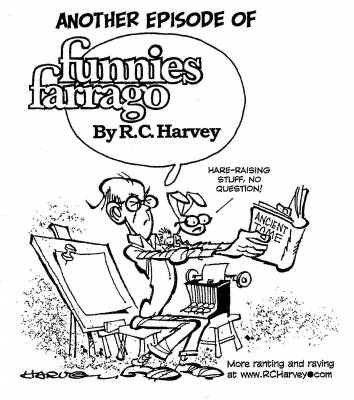 In the next issue, due out momentarily, “when a weirdo talks and threatens Sunstar’s girlfriend, Jesus tries to prevent the supehero from succumbing to rage. But God has other plans…”
In the next issue, due out momentarily, “when a weirdo talks and threatens Sunstar’s girlfriend, Jesus tries to prevent the supehero from succumbing to rage. But God has other plans…”
I’ll be there to see how Second Coming works out. And if, like me, you enjoy a fun story, well-drawn and leaning satirically toward matters of huge philosophical and religious moment, you’ll be there, too.
- Funnies Farrago Celebrates a Half Century of Doonesbury - June 1, 2022
- Who Really Invented the Comic Character ‘Archie’? - May 7, 2022
- Dick Wright Returns - April 5, 2022

